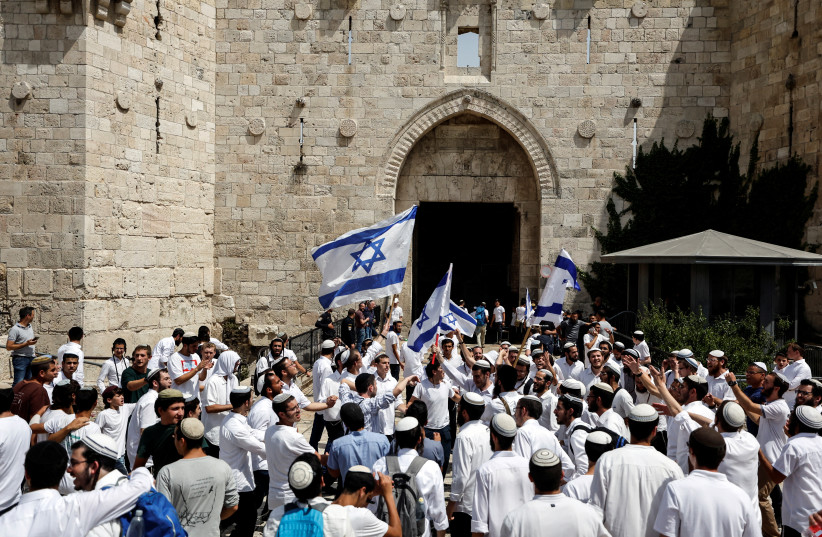There was everything at the Jerusalem Day parade at Damascus Gate on Sunday. Well, almost everything.
Tens of thousands of people flocked to the Old City to celebrate the 55th anniversary of the Six Day War and the reunification of the Jewish people’s eternal capital. There were families pushing strollers with kids eating cotton candy; there were youth beating drums as their friends chanted Am Yisrael Chai; and there were flags of the Jewish supremacist organization Lehava, whose members wore stickers reading, “Today everyone knows: Rabbi Kahana was right.”
At one point, a group of burly men wearing tight black T-shirts and black caps showed up at the gate. They were members of La Familia, a racist fan group that supports Beitar Jerusalem FC. They lit a few yellow torches and threw them wildly into the crowd. One landed under a baby stroller, causing panic when the parents grabbed their children and pulled them to safety. The men then started to chant – for a number of minutes – “Death to Arabs.”
There were some scuffles and there were also some arrests, but by and large, the march seemed to have passed quietly by nightfall. Unlike last year, Hamas did not fire rockets at Jerusalem.
So who wasn’t there? Non-religious Israelis. The march was almost exclusively attended by people from the National-Religious camp – youths from Bnei Akiva, yeshiva students and girls from ulpanot from across the country.
Sunday afternoon would have been the perfect time for Defense Minister Benny Gantz to order the IDF to evacuate some of the illegal outposts in the West Bank, since based on the makeup of the crowd at Damascus Gate, it seemed like all of the West Bank Hilltop Youth were in Jerusalem.

If you were one of the people who were not in Jerusalem on Sunday, you wouldn’t have even known that it was Jerusalem Day. There is no celebration in other parts of the country like in Jerusalem, and the day has no special significance. Without the Hamas threat, most of the country would not have even known that something special was happening.
And that is sad because no matter where you stand politically, Jerusalem Day should be a day that is worth taking a moment to think about.
After all, the Six-Day War was Israel’s greatest military victory and possibly one of the most amazing military feats in modern history. Israel at the time was a mere 19 years old but succeeded in defeating three large Arab armies, reunifying its capital and tripling in size.
How did we get here?
For years, Jerusalem Day was part of the national consensus. One man who said he had been coming to the parade for the last 30 years, lamented the way it has been taken over by extremists. “It used to be families and the average Zionist Israeli,” he said. Pointing at the La Familia group, he said, “Now it is these guys.”
How did we get here? What happened to Israel that Jerusalem Day – a day that was created to celebrate an amazing historic achievement – has turned into something that looks more like the “Israeli Far-Right Day?”
These are difficult questions to answer but they connect with recent polling that shows 70% of the country opposed to the participation of an Arab party in a future coalition. These same polls show Itamar Ben-Gvir, the far-right follower of Meir Kahane, receiving six seats if he ran in the next election at the head of his own party.
There is no hiding the fact that a significant percentage of Israel has taken a turn to the far-right. They use terminology borrowed from white supremacists in the US, and just like there are racists across the Atlantic, there are sadly racists here as well.
The problem is that here, in Israel, we are not showing the alternative. When consecutive Israeli governments consistently delegitimize Arab politicians and the Palestinian Authority, why should any of these people think something different? Why would they not turn to the far-right?
Yes, Naftali Bennett formed a historic partnership with Ra’am leader Mansour Abbas, but let’s not forget that just days before the 2021 election, he called Abbas a supporter of terrorism. Benjamin Netanyahu continues to talk that way today. Do we honestly believe that those sentiments just fade away? That they don’t trickle down into the public discourse?
For the needle to move, systemic change is needed. It starts in the education system and continues through the political system and into our daily discourse.
Israel’s government needs to realize that ignoring the Palestinian conflict and Arabs in Israel comes at a price. It is an ugly one that reared its racist head on Sunday at Damascus Gate.
